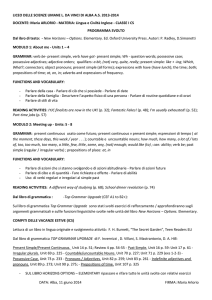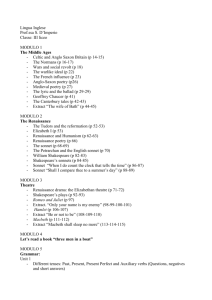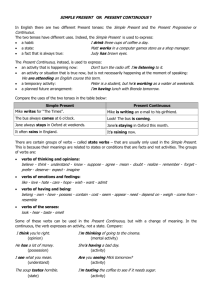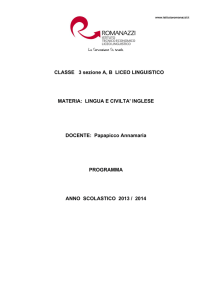ARC 4930 VIA Italian Language & Culture
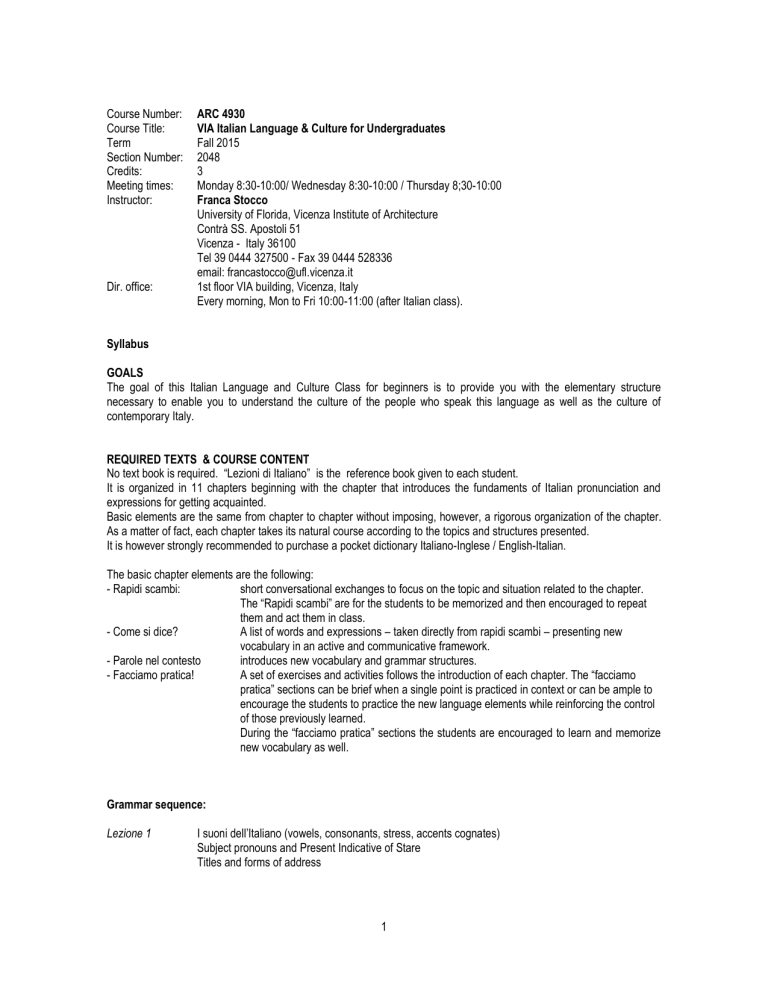
Course Number: ARC 4930
Course Title: VIA Italian Language & Culture for Undergraduates
Term Fall 2015
Section Number: 2048
Credits: 3
Meeting times: Monday 8:30-10:00/ Wednesday 8:30-10:00 / Thursday 8;30-10:00
Instructor: Franca Stocco
Dir. office:
University of Florida, Vicenza Institute of Architecture
Contrà SS. Apostoli 51
Vicenza - Italy 36100
Tel 39 0444 327500 - Fax 39 0444 528336 email: francastocco@ufl.vicenza.it
1st floor VIA building, Vicenza, Italy
Every morning, Mon to Fri 10:00-11:00 (after Italian class).
Syllabus
GOALS
The goal of this Italian Language and Culture Class for beginners is to provide you with the elementary structure necessary to enable you to understand the culture of the people who speak this language as well as the culture of contemporary Italy.
REQUIRED TEXTS & COURSE CONTENT
No text book is required. “Lezioni di Italiano” is the reference book given to each student.
It is organized in 11 chapters beginning with the chapter that introduces the fundaments of Italian pronunciation and expressions for getting acquainted.
Basic elements are the same from chapter to chapter without imposing, however, a rigorous organization of the chapter.
As a matter of fact, each chapter takes its natural course according to the topics and structures presented.
It is however strongly recommended to purchase a pocket dictionary Italiano-Inglese / English-Italian.
The basic chapter elements are the following:
- Rapidi scambi: short conversational exchanges to focus on the topic and situation related to the chapter.
- Come si dice?
- Parole nel contesto
- Facciamo pratica!
The “Rapidi scambi” are for the students to be memorized and then encouraged to repeat them and act them in class.
A list of words and expressions – taken directly from rapidi scambi – presenting new vocabulary in an active and communicative framework. introduces new vocabulary and grammar structures.
A set of exercises and activities follows the introduction of each chapter. The “facciamo pratica” sections can be brief when a single point is practiced in context or can be ample to encourage the students to practice the new language elements while reinforcing the control of those previously learned.
During the “facciamo pratica” sections the students are encouraged to learn and memorize new vocabulary as well.
Grammar sequence:
Lezione 1 I suoni dell’Italiano (vowels, consonants, stress, accents cognates)
Subject pronouns and Present Indicative of Stare
Titles and forms of address
1
Lezione 2
Lezione 3
Lezione 4
Lezione 5
Lezione 6
Lezione 7
Lezione 8
Lezione 9
Lezione 10
Lezione 11
Present indicative of Essere
C’è – ci sono – ecco!
Negative and Interrogative expressions
Present Indicative of Avere
Idioms with Avere
Present Indicative of –Are verbs
Verbi Irregolari: Present Indicative of Andare
Prepositions with Andare
Nouns and indefinite articles
Plural forms of nouns and definite articles
Adjectives
Position of descriptive adjectives
Present Indicative of –Ere verbs
Present Indicative of –Ire verbs
Simple prepositions
Numbers
Irregular –Ire verbs: Uscire and Venire
Adverbs and adjectives expressing quantity: Molto, Tanto, Troppo, Poco
Present Indicative of Volere
Present Indicative of Potere, Dovere and Bere
Possessive Adjectives and Pronouns
The demonstrative Adjective Questo
The adjective and demonstrative pronouns Quello and Bello
Questo and Quello as demonstrative pronouns
Present Indicative of Sapere and Conoscere
Direct Object Pronouns: Lo, La, Li, Le
Ecco + object pronouns!
Irregular –Are verbs: Fare, Dare and Stare
Idioms with Fare, Dare and Stare
Present Indicative of Dire and Parlare
The adverb Ci
Informal Imperative of –Are verbs
Informal Imperative of Stare, Andare, Dare and Fare
Informal Imperative of –Ere and –Ire verbs
Passato Prossimo (Present Perfect) With Avere
Adverbs with the Passato Prossimo
Passato Prossimo (Present Perfect) with Essere
Reflexive verbs
Present Indicative and Present Perfect
The reciprocal construction
Direct and Indirect Object Pronouns. Mi, Ti, Ci Vi
Direct and Indirect Object Pronouns: Summary
The verb Piacere
Informal Imperative with pronouns
2
Other grammatical structures: Adjectives, forms and agreement
Pronouns
Numbers
Days, months, seasons, dates, hours
Idiomatic expressions
Many grammatical structures will be presented, practiced and reinforced through the class activities during the semester such as “Letture in Gioco” or “Conversazioni” as well as “Giochiamo Insieme”, to encougage either the writing as well as the reading and comprehension.
BIBLIOGRAPHY
Any pocket dictionary Italiano-Inglese / English-Italian
The following bibliography will be available at VIA library
Reading:
Il Signor Rigoni by Giovanni Ducci, Alma Edizioni 2003
Pasta per Due by Giovanni Ducci, Alma Edizioni 2003
Fantasmi by A. De Giuli – C.M. Naddeo, Alma Edizioni 2010
Dov’è Yuko? by A. De Giuli – C.M. Naddeo, Alma Edizioni 2010
Dolomiti by A. De Giuli, Alma Edizioni 2010
Regarding grammar fundamentals:
L’Italiano Facile
Corso di lingua per stranieri by Francine Pellegrtini, chara Gaglieri, Hoepli, 2003
Parliamo Italiano! by Suzanne Branciforte, Anna Grassi, Houghton Mifflin Company 2006
Prego! An Invitation to Italian by Lazzarino, Aski, Dini, Peccianti, McGraw-Hill 2000
Espresso
Corso di Italiano 1 by Luciana Ziglio, Giovanni Rizzo, Ama Edizioni 2001
Nuovo Progetto Italiano by Marin, Magnelli, Edilingua 2006
Movies: (5 to 7 movies will be assigned during the semester for vision and written comment)
ROMA CITTA’ APERTA by Roberto Rossellini, 1945
LADRI DI BICICLETTE by Vittorio de Sica, 1948
LA STRADA by Federico Fellini, 1954
LA GRANDE GUERRA by Mario Monicelli, 1959
LA DOLCE VITA by Federico Fellini, 1960
L’ECLISSE by Michelangelo Antonioni, 1962
MAMMA ROMA by Pier Paolo Pasolini, 1962
IL DESERTO ROSSO by Michelangelo Antonioni, 1964
MATRIMONIO ALL'ITALIANA by Vittorio De Sica, 1964
3
UNA GIORNATA PARTICOLARE by Ettore Scola, 1977
AMARCORD by Federico Fellini 1978
LA MESSA E' FINITA by Nanni Moretti, 1985
IL NOME DELLA ROSA by Jean Jacques Annaud, 1986
TURNE' by Gabriele Salvatores, 1990
MEDITERRANEO by Gabriele Salvatores, 1991
CARO DIARIO by Nanni Moretti, 1993
L'UOMO DELLE STELLE by Giuseppe Tornatore, 1995
LA SECONDA VOLTA by Mimmo Calopresti, 1995
MARIANNA UCRIA by Roberto Faenza 1997
IL TESTIMONE DELLO SPOSO by Pupi Avati, 1997
OVOSODO by Paolo Virzì, 1998
LA VITA E' BELLA by Roberto Benigni, 1998
COME TE NESSUNO MAI by Gabriele Muccino, 1999
PANE E TULIPANI by Silvio Soldini, 2000
LA STANZA DEL FIGLIO by Nanni Moretti, 2000
L'ULTIMO BACIO by Gabriele Muccino, 2001
LE FATE IGNORANTI by Ferzan Ozpetek, 2001
IO NON HO PAURA by Gabriele Salvatores, 2003
RICORDATI DI ME by Gabriele Muccino, 2003
CATERINA VA IN CITTA' by Paolo Virzì, 2003
PRIMO AMORE by Matteo Garrone, 2003
SE DEVO ESSERE SINCERA by Davide Ferrario, 2004
I GIORNI DELL'ABBANDONO by Roberto Faenza, 2005
LA BESTIA NEL CUORE by Cristina Comencini, 2005
MANUALE D'AMORE by Giovanni Veronesi, 2005
LA VITA CHE VORREI by Giuseppe Piccioni, 2005
LA FEBBRE by Alessandro D’Alatri, 2005
CASOMAI by Alessandro D’Alatri, 2005
MANUALE D'AMORE 2, by Giovanni Veronesi, 2006
NOTTE PRIMA DEGLI ESAMI by Fausto Brizzi 2006
IL VENTO FA IL SUO GIRO by Giorgio Diritti, 2006
MIO FRATELLO E' FIGLIO UNICO by Daniele Lucchetti, 2007
COMMEDIASEXY by Alessandro D’Alatri, 2007
L'AMICO DI FAMIGLIA by Paolo Sorrentino, 2007
SATURNO CONTRO by Ferzan Ozpetek, 2007
TUTTA LA VITA DAVANTI by Paolo Virzì, 2008
CAOS CALMO by Antonello Grimaldi, 2008
GIORNI E NUVOLE by Silvio Soldini, 2007
NON C'E' PIU' NIENTE DA FARE by Emanuele Barresi, 2007
GOMORRA by Matteo Garrone, 2008
LA GIUSTA DISTANZA by Carlo Mazzacurati, 2008
AMORE BUGIE & CALCETTO by Luca Lucini, 2008
IL PASSATO E' UNA TERRA STRANIERA by Daniele Vicari, 2009
MAR NERO by Federico Bondi, 2009
PRANZO DI FERRAGOSTO by Gianni di Gregorio, 2009
IO SONO L’AMORE by Luca Guadagnino, 2009
L’UOMO CHE VERRA’ by Giorgio Diritti, 2010
E’ STATO IL FIGLIO by Daniele Cipri, 2012
TERRAFERMA by Emanuele Crialese, 2012
IO SONO LI by Andrea Segre, 2013
4
CLASS REQUIREMENTS
1) Attend class regularly
2) Read all the readings
3) Participation. Active participation is necessary for language learning. 20% of your grade will be based on participation.
GRADING
The final documented project, in combination with class participation will be the basis for grading.
EVALUATION OUT 100%
-
-
Attendance/Class Participation;
Movies
- Homework & Tests
20% (for each absense 5 points will be deducted)
15%
15%
- Quiz 1
- Quiz 2
- Quiz 3
- Written final
10%
10%
10%
20%
(The dates of all quizzes and finals will be coordinated to the V.I.A. schedule as soon as it is finalized)
All grading will follow UF policies that you can find at: https://catalog.ufl.edu/ugrad/current/regulations/info/grades.aspx
NUMERICAL TO LETTER GRADE CONVERSION
Grading Scale
Letter Grade A A- B+ B B- C+ C C- D+ D D- E
Numeric Grade 93-100 90-92 87-89 83-86 80-82 77-79 73-76 70-72 67-69 63-66 60-62 0-59
Quality Points 4.0 3.67 3.33 3.0 2.67 2.33 2.0 1.67 1.33 1.0 0.67 0.0
E-MAIL POLICY: E-mail is appropriate only for quick messages and replies. You are welcome to e-mail instructor only with brief questions or comments (e.g., a request for an appointment, a question that can be answered in a sentence or two). I will answer your messages as I have the opportunity, but cannot guarantee immediate responses.
GENERAL INFORMATION: The instructor will follow the topics outlined above but these topics are by no means binding as a topic may be changed at any time according to the discretion of the instructor.
ATTENDANCE POLICY: Students are expected to attend all classes. The instructor will not provide class notes to students who miss class. In the event of an absence, a student may obtain “class notes” from other students. Acceptable reasons for absence are included in the UF attendance: https://catalog.ufl.edu/ugrad/current/regulations/info/attendance.aspx
LATE WORK POLICY: If have you a documented reason to turn in late work, this should be discussed with Instructor before the deadline.
Unexcused late work will be devalued at the rate of 10 % per day late up to one week late. Zero credit for any work later than one week.
MAKE-UP WORK POLICY: At the end of the semester, late work for special justified reasons, will give a grade of incomplete. If an incomplete grade is issued, a make-up work plan and deadline will be determined by the instructor and student per UF policy: https://catalog.ufl.edu/ugrad/current/regulations/info/grades.aspx
5
STUDENTS WITH DISABILITIES: Students requesting classroom accommodation must first register with the Dean of
Students Office. The Dean of Students Office will provide documentation to the student who must then provide this documentation to the Instructor when requesting accommodation
HONOR CODE: As a student at the University of Florida, you have committed yourself to uphold the Honor Code, which includes the following pledge: “We, the members of the University of Florida community, pledge to hold ourselves and
our peers to the highest standards of honesty and integrity. “ You are expected to exhibit behavior consistent with this commitment to the UF academic community, and on all work submitted for credit at the University of Florida, the following pledge is either required or implied: "On my honor, I have neither given nor received unauthorized aid in doing this
assignment." It is assumed that you will complete all work independently in each course unless the instructor provides explicit permission for you to collaborate on course tasks (e.g. assignments, papers, quizzes, exams). Furthermore, as part of your obligation to uphold the Honor Code, you should report any condition that facilitates academic misconduct to appropriate personnel. It is your individual responsibility to know and comply with all university policies and procedures regarding academic integrity and the Student Honor Code. Violations of the Honor Code at the University of Florida will not be tolerated. Violations will be reported to the Dean of Students Office for consideration of disciplinary action. For more information regarding the Student Honor Code, please see: http://www.dso.ufl.edu/SCCR/honorcodes/honorcode.php
6
